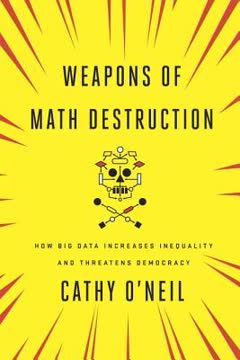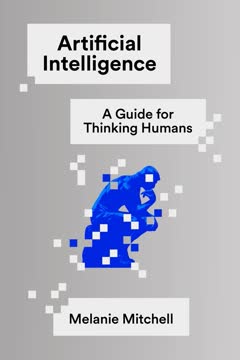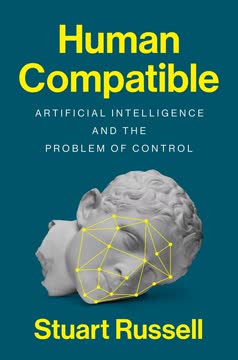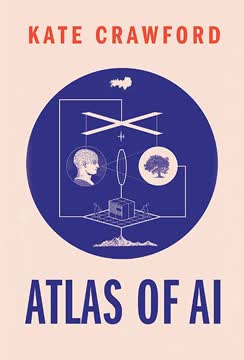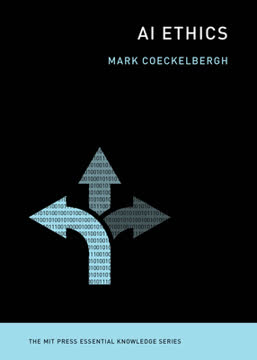نکات کلیدی
1. تأثیر فراگیر هوش مصنوعی نیازمند توجه اخلاقی است
هوش مصنوعی هماکنون در حال وقوع است و بهطور فراگیر، اغلب بهصورت نامرئی در ابزارهای روزمره ما و بهعنوان بخشی از سیستمهای پیچیده تکنولوژیکی جای گرفته است.
فراگیری هوش مصنوعی: هوش مصنوعی بهطور بیوقفهای در زندگی روزمره ما ادغام شده است، از الگوریتمهای شبکههای اجتماعی تا تشخیصهای پزشکی. این فراگیری سؤالات اخلاقی فوری درباره تأثیر آن بر جامعه، حریم خصوصی و خودمختاری انسانی را مطرح میکند.
چالشهای اخلاقی: با پیچیدهتر شدن هوش مصنوعی، با معضلات اخلاقی پیچیدهای روبرو میشویم:
- آیا خودروهای خودران باید ایمنی مسافران را بر عابران پیاده ترجیح دهند؟
- چگونه میتوانیم اطمینان حاصل کنیم که هوش مصنوعی تعصبات موجود را تداوم یا تقویت نمیکند؟
- پیامدهای نظارت مبتنی بر هوش مصنوعی بر حریم خصوصی شخصی چیست؟
این سؤالات نیازمند توجه دقیق و سیاستگذاری پیشگیرانه هستند تا اطمینان حاصل شود که هوش مصنوعی به نفع بشریت عمل میکند و آسیبهای احتمالی را به حداقل میرساند.
2. مباحث فلسفی درباره هوش مصنوعی چالشهایی برای استثناگرایی انسانی ایجاد میکند
داروین و فروید باورهای ما درباره استثناگرایی، احساسات برتری و خیالهای کنترل را از بین بردند؛ امروز، هوش مصنوعی به نظر میرسد که ضربه دیگری به تصویر خود از انسانیت وارد میکند.
بازتعریف انسانیت: توسعه هوش مصنوعی ما را وادار میکند تا با سؤالات بنیادی درباره طبیعت انسانی، آگاهی و جایگاه ما در جهان روبرو شویم. فیلسوفان و دانشمندان بحث میکنند که آیا ماشینها میتوانند واقعاً فکر کنند، احساس کنند یا دارای آگاهی باشند.
سؤالات فلسفی کلیدی:
- آیا ماشینها میتوانند هوش واقعی داشته باشند یا فقط آن را شبیهسازی میکنند؟
- آگاهی چیست و آیا میتوان آن را بهطور مصنوعی تکرار کرد؟
- اگر ماشینها تواناییهای شناختی انسانی را پشت سر بگذارند، چه پیامدهایی برای ارزش و هدف انسانی خواهد داشت؟
این مباحث چالشهایی برای مفاهیم دیرینه استثناگرایی انسانی ایجاد میکنند و ما را وادار میکنند تا بازنگری کنیم که در عصر ماشینهای هوشمندتر، انسان بودن به چه معناست.
3. قابلیتها و کاربردهای فعلی هوش مصنوعی زندگی روزمره ما را شکل میدهند
یادگیری ماشینی میتواند برای تشخیص چهرهها (و حتی تشخیص احساسات بر اساس تحلیل چهرهها)، ارائه پیشنهادات جستجو، رانندگی خودرو، پیشبینی شخصیت، پیشبینی مجدد ارتکاب جرم یا توصیه موسیقی برای گوش دادن استفاده شود.
کاربردهای دنیای واقعی: هوش مصنوعی از داستانهای علمی تخیلی و مباحث نظری فراتر رفته و به بخشی جداییناپذیر از صنایع مختلف و فعالیتهای روزمره تبدیل شده است.
نمونههایی از هوش مصنوعی در عمل:
- بهداشت و درمان: هوش مصنوعی در تشخیص بیماریها و توسعه برنامههای درمانی کمک میکند
- مالی: الگوریتمها تراکنشهای تقلبی را شناسایی و تصمیمات سرمایهگذاری میگیرند
- حمل و نقل: خودروهای خودران و سیستمهای نگهداری پیشبینیکننده
- سرگرمی: توصیههای محتوای شخصیسازیشده در پلتفرمهای پخش
- خدمات مشتری: چتباتها و دستیاران مجازی به سؤالات پاسخ میدهند
این کاربردها پتانسیل هوش مصنوعی برای افزایش کارایی و تصمیمگیری در زمینههای مختلف را نشان میدهند، در حالی که نگرانیهایی درباره جابجایی شغلی و وابستگی بیش از حد به سیستمهای خودکار را نیز مطرح میکنند.
4. یادگیری ماشینی و علم داده پیشرفتهای هوش مصنوعی را هدایت میکنند
دانشمندان قبلاً نظریههایی برای توضیح دادهها و پیشبینیها ایجاد میکردند؛ در یادگیری ماشینی، کامپیوتر مدلهای خود را که با دادهها سازگار هستند، ایجاد میکند.
تغییر پارادایم: یادگیری ماشینی نمایانگر تغییری بنیادی در نحوه برخورد با حل مسئله و تحلیل دادهها است. بهجای تکیه صرف بر نظریهها و مدلهای انسانی، سیستمهای هوش مصنوعی میتوانند بهطور خودکار الگوها را شناسایی و از مقادیر عظیم دادهها بینشهایی تولید کنند.
مفاهیم کلیدی در یادگیری ماشینی:
- یادگیری نظارتشده: هوش مصنوعی از دادههای برچسبدار برای پیشبینیها یاد میگیرد
- یادگیری بدون نظارت: هوش مصنوعی الگوها را در دادههای بدون برچسب شناسایی میکند
- یادگیری تقویتی: هوش مصنوعی از طریق آزمون و خطا یاد میگیرد و بازخوردی درباره اقدامات خود دریافت میکند
- یادگیری عمیق: شبکههای عصبی با لایههای متعدد الگوهای پیچیده را پردازش میکنند
این رویکرد مبتنی بر داده منجر به پیشرفتهایی در زمینههایی مانند پردازش زبان طبیعی، بینایی کامپیوتری و تحلیل پیشبینیکننده شده است، که به هوش مصنوعی امکان میدهد وظایف پیچیدهتری را انجام دهد و پیشبینیهای دقیقتری ارائه دهد.
5. هوش مصنوعی نگرانیهای مهمی درباره حریم خصوصی، تعصب و مسئولیتپذیری ایجاد میکند
خطر این است که بار دیگر، قدرت بدون دانش و (بنابراین) بدون مسئولیت اعمال شود—و بدتر از آن، دیگران تحت تأثیر این قرار گیرند.
مخاطرات اخلاقی: با قدرتمندتر و تأثیرگذارتر شدن سیستمهای هوش مصنوعی، آنها خطرات و چالشهای اخلاقی جدیدی را معرفی میکنند که باید به آنها پرداخته شود.
نگرانیهای اخلاقی کلیدی:
- حریم خصوصی: طبیعت دادهمحور هوش مصنوعی سؤالاتی درباره جمعآوری و استفاده از دادهها مطرح میکند
- تعصب: سیستمهای هوش مصنوعی میتوانند تعصبات اجتماعی موجود را تداوم و تقویت کنند
- مسئولیتپذیری: تعیین مسئولیت برای تصمیمات مبتنی بر هوش مصنوعی پیچیده است
- شفافیت: بسیاری از سیستمهای هوش مصنوعی بهعنوان "جعبههای سیاه" عمل میکنند، که درک فرآیندهای تصمیمگیری آنها را دشوار میکند
- جابجایی شغلی: خودکارسازی هوش مصنوعی ممکن است منجر به اختلالات قابلتوجهی در نیروی کار شود
پرداختن به این نگرانیها نیازمند رویکردی چندرشتهای است که شامل فناوران، اخلاقگرایان، سیاستگذاران و جوامع تحت تأثیر قرار گرفته میشود تا شیوههای مسئولانه هوش مصنوعی و تدابیر حفاظتی را توسعه دهند.
6. سیاستگذاران با تنظیم توسعه و استفاده از هوش مصنوعی دست و پنجه نرم میکنند
حتی اگر شفافیت مطلوب و ممکن باشد، ممکن است در عمل تحقق آن دشوار باشد. بهعنوان مثال، شرکتهای خصوصی ممکن است نخواهند الگوریتمهای خود را فاش کنند زیرا میخواهند منافع تجاری خود را حفظ کنند.
چالشهای نظارتی: سیاستگذاران با وظیفه دلهرهآور ایجاد چارچوبهایی روبرو هستند که نوآوری را ترویج میکنند و در عین حال از منافع عمومی و حقوق فردی محافظت میکنند.
ملاحظات سیاستی کلیدی:
- تعادل بین نوآوری و تنظیم
- اطمینان از شفافیت و قابلیت توضیح هوش مصنوعی
- حفاظت از حریم خصوصی و حقوق دادهها
- پرداختن به جابجایی شغلی احتمالی
- ترویج توسعه و استفاده اخلاقی از هوش مصنوعی
- همکاری بینالمللی در حاکمیت هوش مصنوعی
تنظیم مؤثر هوش مصنوعی نیازمند درک دقیق از فناوری، تأثیرات بالقوه آن و ذینفعان متنوع درگیر است. سیاستگذاران باید منافع متضاد و چشماندازهای تکنولوژیکی بهسرعت در حال تحول را برای ایجاد چارچوبهای نظارتی تطبیقی و آیندهنگر هدایت کنند.
7. تعادل پیشرفت هوش مصنوعی با اولویتهای محیطی و اجتماعی
هوش مصنوعی همچنین میتواند مشکلاتی ایجاد کند و احتمالاً اوضاع را برای محیط زیست بدتر کند—و بنابراین برای همه ما. دوباره به افزایش مصرف انرژی و زباله توجه کنید.
دیدگاه جامع: در حالی که هوش مصنوعی راهحلهای بالقوهای برای چالشهای جهانی ارائه میدهد، ضروری است که تأثیرات گستردهتر آن بر جامعه و محیط زیست را در نظر بگیریم.
ملاحظات کلیدی:
- تأثیرات محیطی: مصرف انرژی و تولید زباله الکترونیکی هوش مصنوعی
- تغییرات اقلیمی: نقش هوش مصنوعی در تشدید و کاهش مسائل اقلیمی
- عدالت اجتماعی: اطمینان از توزیع عادلانه منافع هوش مصنوعی در سراسر جامعه
- توسعه انسانمحور: اولویتبندی رفاه انسانی در پیشرفت هوش مصنوعی
- پایداری بلندمدت: همراستایی پیشرفت هوش مصنوعی با اهداف توسعه پایدار
در حالی که فناوریهای هوش مصنوعی را توسعه و بهکار میگیریم، باید رویکردهای پایدار و فراگیر را در اولویت قرار دهیم که نه تنها پیشرفت تکنولوژیکی بلکه حفاظت از محیط زیست و مسئولیت اجتماعی را نیز در نظر بگیرند. این امر نیازمند گفتگوی مداوم بین فناوران، سیاستگذاران، محیطزیستگرایان و ذینفعان متنوع است تا آیندهای از هوش مصنوعی شکل گیرد که به بهبود زندگی انسان کمک کند و در عین حال سیاره ما را حفظ کند.
آخرین بهروزرسانی::
FAQ
What's "AI Ethics" by Mark Coeckelbergh about?
- Overview of AI Ethics: The book explores the ethical implications of artificial intelligence (AI) and its impact on society, focusing on both current and future challenges.
- Philosophical and Practical Issues: It addresses philosophical questions about the nature of AI and its moral status, as well as practical issues like bias, privacy, and responsibility.
- Policy and Regulation: Coeckelbergh discusses the need for policy and regulation to ensure AI technologies are developed and used ethically.
- Cultural and Historical Context: The book places AI ethics within a broader cultural and historical context, examining narratives and fears surrounding AI.
Why should I read "AI Ethics" by Mark Coeckelbergh?
- Comprehensive Insight: The book provides a thorough understanding of the ethical challenges posed by AI, making it essential for anyone interested in technology and ethics.
- Interdisciplinary Approach: It combines insights from philosophy, technology, and policy, offering a well-rounded perspective on AI ethics.
- Current and Future Relevance: As AI becomes more integrated into daily life, understanding its ethical implications is crucial for informed decision-making.
- Engaging Narratives: Coeckelbergh uses historical and cultural narratives to make complex ethical issues more relatable and understandable.
What are the key takeaways of "AI Ethics" by Mark Coeckelbergh?
- Ethical Challenges: AI presents numerous ethical challenges, including bias, privacy concerns, and the need for transparency and accountability.
- Human-Centric Approach: The book advocates for a human-centric approach to AI, ensuring technology serves human interests and values.
- Policy and Regulation: Effective policy and regulation are necessary to address the ethical issues associated with AI and to guide its development responsibly.
- Philosophical Inquiry: Understanding AI ethics requires philosophical inquiry into the nature of intelligence, agency, and moral responsibility.
What are the best quotes from "AI Ethics" by Mark Coeckelbergh and what do they mean?
- "AI is already happening today and it is pervasive, often invisibly embedded in our day-to-day tools." This highlights the ubiquity of AI in modern life and the importance of understanding its ethical implications.
- "AI ethics is about technological change and its impact on individual lives, but also about transformations in society and in the economy." This quote emphasizes the broad impact of AI, affecting not just individuals but entire societal structures.
- "The challenge for us today, then, is to make sure that we build AI that somehow does not raise this control problem—that it does what we want and takes into consideration our rights." This underscores the importance of designing AI systems that respect human autonomy and rights.
How does Mark Coeckelbergh define AI in "AI Ethics"?
- Intelligence Displayed by Machines: AI is defined as intelligence displayed or simulated by code or machines, often compared to human intelligence.
- Beyond Human-Like Intelligence: Coeckelbergh notes that intelligence need not be human-like, and AI can encompass a range of cognitive functions.
- Historical Context: The book traces the history of AI from early philosophical ideas to modern technological developments.
- Practical Applications: AI is seen as both a scientific discipline and a practical technology with applications across various domains.
What ethical issues does "AI Ethics" by Mark Coeckelbergh address?
- Bias and Discrimination: The book discusses how AI can perpetuate societal biases and the ethical implications of such discrimination.
- Privacy Concerns: AI's ability to collect and analyze vast amounts of data raises significant privacy issues.
- Responsibility and Accountability: Coeckelbergh explores who should be held accountable for the actions and decisions made by AI systems.
- Transparency and Explainability: The need for AI systems to be transparent and explainable to ensure trust and accountability is emphasized.
How does "AI Ethics" by Mark Coeckelbergh approach the concept of moral agency in AI?
- Moral Agency Defined: Moral agency involves the capacity for moral reasoning and decision-making, traditionally attributed to humans.
- AI's Moral Capacity: The book questions whether AI can possess moral agency, given its lack of consciousness and emotions.
- Functional Morality: Coeckelbergh discusses the idea of functional morality, where AI systems are designed to evaluate ethical consequences without full moral agency.
- Human Responsibility: Ultimately, the book argues that humans must retain responsibility for AI's actions, as machines lack the necessary moral capacities.
What role does policy play in "AI Ethics" by Mark Coeckelbergh?
- Regulatory Frameworks: The book emphasizes the importance of developing regulatory frameworks to address AI's ethical challenges.
- Proactive Measures: Coeckelbergh advocates for proactive ethics, integrating ethical considerations into AI design and development.
- Stakeholder Involvement: Effective policy requires input from various stakeholders, including governments, tech companies, and the public.
- Balancing Innovation and Ethics: The book discusses the need to balance technological innovation with ethical considerations to ensure AI benefits society.
How does "AI Ethics" by Mark Coeckelbergh address the future of work?
- Job Displacement Concerns: The book explores the potential for AI to displace jobs and the ethical implications of such changes.
- Economic Transformation: Coeckelbergh discusses how AI could transform economies and the nature of work itself.
- Meaningful Work: The book questions what constitutes meaningful work and how AI might impact human fulfillment and purpose.
- Policy Responses: Coeckelbergh suggests policy measures to address job displacement and ensure equitable distribution of AI's benefits.
What is the significance of cultural and historical narratives in "AI Ethics" by Mark Coeckelbergh?
- Contextual Understanding: Cultural and historical narratives provide context for understanding contemporary fears and hopes about AI.
- Frankenstein and Golem Myths: The book examines myths like Frankenstein and the Golem to illustrate longstanding concerns about creating artificial beings.
- Narrative Influence: Coeckelbergh argues that these narratives shape public perception and policy regarding AI.
- Constructing New Narratives: The book suggests constructing new narratives to better understand and guide AI's development.
How does "AI Ethics" by Mark Coeckelbergh address the concept of superintelligence?
- Definition and Concerns: Superintelligence refers to AI surpassing human intelligence, raising concerns about control and existential risks.
- Speculative Nature: Coeckelbergh notes that while superintelligence is a popular topic, it remains speculative and distant.
- Focus on Current Issues: The book emphasizes addressing current ethical challenges rather than distant superintelligence scenarios.
- Philosophical Implications: Superintelligence discussions raise philosophical questions about human nature and the future of humanity.
What are the implications of AI on privacy according to "AI Ethics" by Mark Coeckelbergh?
- Data Collection: AI's ability to collect and analyze personal data poses significant privacy risks.
- Surveillance Concerns: The book discusses how AI can be used for surveillance, impacting individual privacy and freedom.
- Informed Consent: Coeckelbergh emphasizes the importance of informed consent and transparency in data collection and use.
- Policy and Regulation: The book advocates for robust policy and regulation to protect privacy in the age of AI.
نقد و بررسی
کتاب اخلاق هوش مصنوعی نظرات متفاوتی را به خود جلب کرده است. این کتاب به خاطر ارائهی خلاصهای قابل فهم از مسائل اخلاقی مرتبط با هوش مصنوعی مورد تحسین قرار گرفته، اما در عین حال به خاطر کمبود عمق انتقاداتی نیز به آن وارد شده است. خوانندگان از معرفی مفاهیم کلیدی و دیدگاههای فلسفی در این کتاب قدردانی میکنند، اما برخی آن را تکراری و فاقد راهحلهای مشخص میدانند. این کتاب به عنوان نقطهی شروع خوبی برای تازهواردان به حوزهی اخلاق هوش مصنوعی تلقی میشود و سوالات مهمی دربارهی تعصب، حریم خصوصی و تأثیرات اجتماعی را مطرح میکند. با این حال، خوانندگان با تجربهتر ممکن است آن را بیش از حد ابتدایی بیابند. برخی نیز به سرعت در حال تحول بودن فناوری هوش مصنوعی اشاره کرده و معتقدند که انتشار این کتاب در سال 2020 آن را قدیمی جلوه میدهد.
Similar Books


